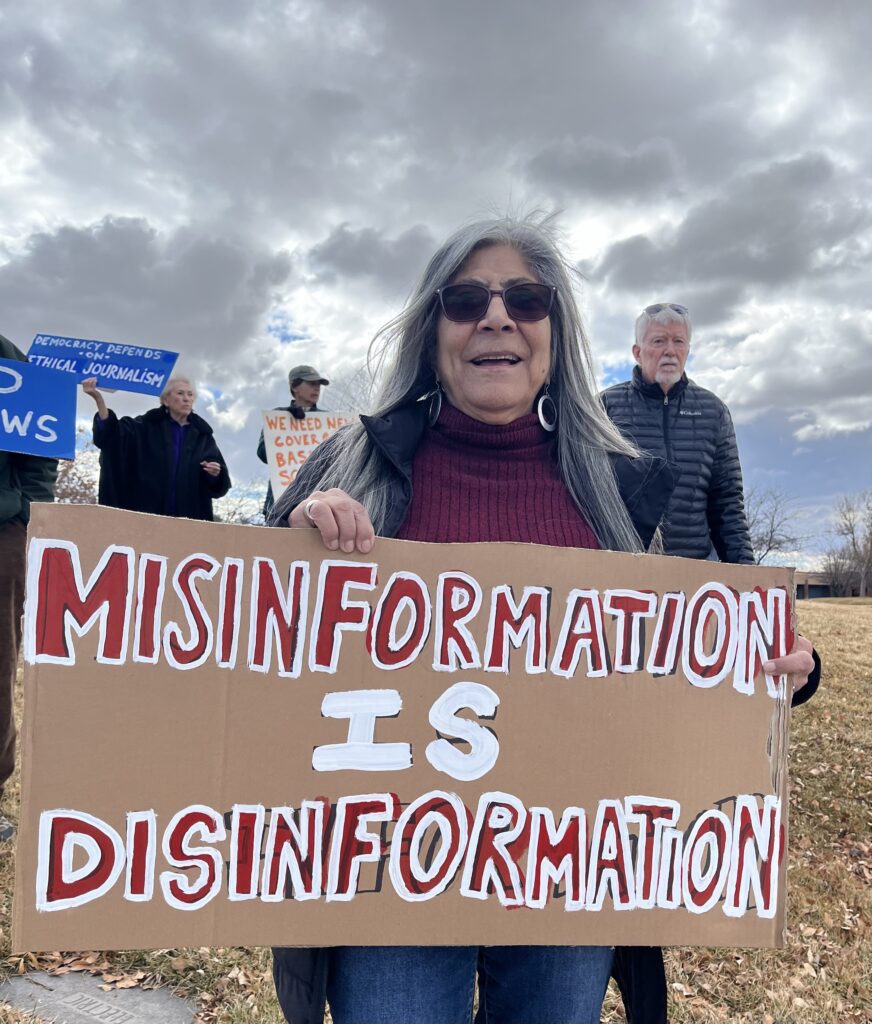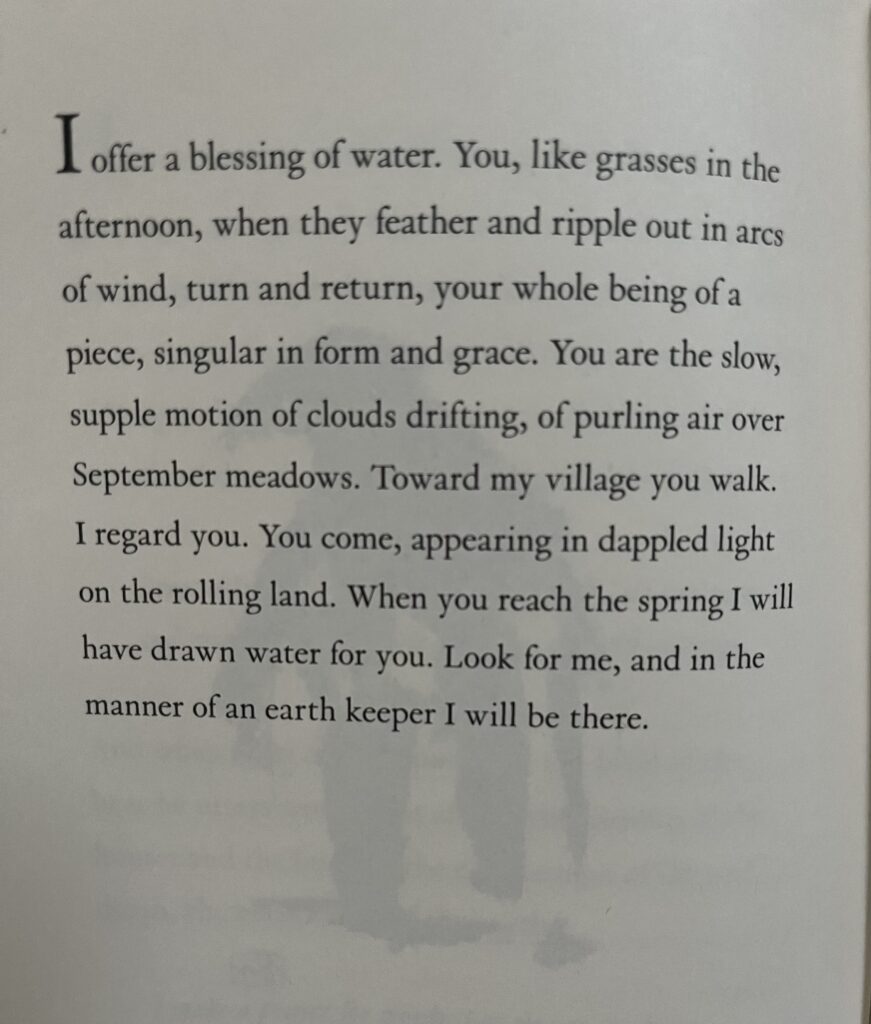‘No segment of the population is safe’

On Friday, I swung by the Albuquerque Journal, where about 40 people were protesting near the newspaper’s offices. (I write “near” because security officers moved the protesters away from the building and across a long parking lot to the corner of Jefferson and Headline.) Sofia Martinez, co-coordinator of Los Jardines Institute, explained they were there because of how the newspaper handled the Albuquerque-Bernalillo County Air Quality Control Board hearing last year.
As you’ll remember, the Albuquerque Bernalillo County Joint Air Quality Board held hearings on a new rule, which South Valley neighborhoods had proposed through the governmental process. The proposed Health, Environment and Equity Impacts rule upset Albuquerque City Councilor Dan Lewis so much that he introduced two bills, one abolishing the air board and another putting a moratorium on new air quality regulations. (Last week, a state District Court judge granted the air board’s request for a preliminary injunction, allowing work to continue.)
Martinez said that by using language directly from industry and conservative city councilors, the editorial board “sabotaged” the hearings and the community’s work on the Health, Environment and Equity Impacts rule. The group delivered a letter to Journal leadership, seeking—among other things—greater diversity on the newspaper’s editorial board.
The institute’s co-director Richard Moore explained, “We’re here to protect the health, safety and well-being of our people. We’ve been doing it for a long time and we’re going to continue to do it until we receive environmental and economic justice for all the communities throughout the city and the county.”
This isn’t the first time the Albuquerque Journal “sided with industry,” Moore said. Or acted paternalistically toward South Valley residents. “When something happens in our community that’s negative…then we make the front page of the Albuquerque Journal,” he said. “But when positive things like this—people trying to protect the health, safety and well-being—take place, then we’re attacked by the editorial staff.”
The Journal did publish a story about the protest from reporters Esteban Candelaria and Alaina Mencinger. Editorial Page Editor Jeff Tucker dismissed the protesters’ concerns, saying: “They don’t understand that editorials are different than news. They have different guidelines and don’t present both sides. We present an argument.”
In 1971, New Mexico voters added a provision to the state constitution declaring that the protection of our “beautiful and healthful environment is hereby declared to be of fundamental importance to the public interest, health, safety and the general welfare.”
It further directed the legislature to provide for “control of pollution and control of despoilment of the air, water and other natural resources of this state, consistent with the use and development of these resources for the maximum benefit of the people.”
Last week, I hosted a conversation with Jozee Zuniga (Youth United for Climate Crisis Action), Daniel Tso (former Tribal Council delegate for the Navajo Nation), and Gail Evans (Senior Attorney with the Climate Law Institute at the Center for Biological Diversity). Representing NM LAWS, Evans is suing the state of New Mexico for failing to uphold its constitutional duty to protect the environment. Tso lives in the Four Corners, Zuniga in the Carlsbad area; both see how oil and gas development affects public health and the environment.
“As an elder person, I have two daughters, seven grandchildren, and I sure would want them to have a good life, having good health,” said Tso, explaining that oil and gas development doesn’t just have isolated impacts on his community. “No segment of the population is safe when we have these aspects of pollution, of this degradation of the environment. Nobody is safe from it. And that’s the part that I think the citizens of New Mexico have to realize.”
Zuniga, who is 22, has been watching the climate crisis unfold her entire life. “When it comes to lawmakers, and especially older generations, I think they have a sense that everything is fine because things were fine decades ago when they were young,” she said. “And I would really like them to kind of catch up and see the situation we’re living in.”
Last week, legislators advanced House Bill 133 to reform the Oil and Gas Act. But key health provisions were stripped from the bill even before its first vote.
“Climate leaders don’t frack. And climate leaders don’t oversee a massive increase in oil and gas production,” Evans told me. “Climate leaders follow the science and say, ‘We need to be phasing out oil and gas.’ I think our state is so reliant on the money from oil and gas, and we talk so much about that money, that we don’t talk about the harm, the pollution, that comes with that oil and gas money and production.”
To watch that three-part conversation, visit the Our Land YouTube page. We talk about life in the oil fields, the right to a “healthful environment,” and oil and gas industry reform in the New Mexico Legislative Session this year.
News you shouldn’t miss:
• “The Cost of Freeing Drinking Water from ‘Forever Chemicals’” (Charles Schmidt, Santa Fe Reporter)
• “New Mexico Bureau of Land Management Office Scraps Proposed Fossil Fuel Regulations” (Jerry Redfern, Capital & Main)
• “Oil and gas gave big in 2023. The industry flexed its muscles this week.” (Marjorie Childress, New Mexico in Depth)
• “Mexican gray wolf compensation proposals move in Santa Fe” (Emma B. Mincks, Source New Mexico)
• “New Mexico tries to jump-start electric vehicle infrastructure ahead of new car rule” (Scott Wyland, Santa Fe New Mexican)
• “Carson announces more post-windstorm restoration projects” (Geoffrey Plant, Taos News)
• “State funding to reduce car crashes with wildlife not a sure thing this year” (Nash Jones, KUNM)
And tune in on Friday night to New Mexico in Focus. I’ll be talking with Executive Producer Jeff Proctor about what’s on tap for 2024, and why I’m pivoting back to more climate change coverage this year.
Lastly, I was sad to hear that N. Scott Momaday died last week. I’ve mentioned him often in this newsletter, most recently a couple of weeks ago. I’m thankful for all his words and send love to those who knew him.

P.S. If a friend forwarded you this message, sign up here to receive the newsletter yourself. You can also read recent newsletters online. And if you miss us throughout the week, follow Our Land on Instagram.


